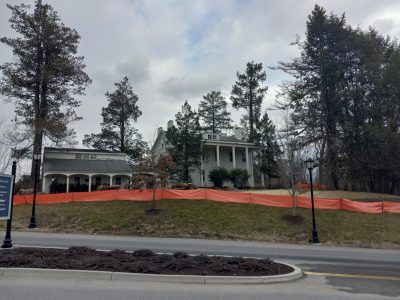Toll Brothers Withdraws Request to Remove Chap Crossing Farmhouse
News Based on facts, either observed and verified directly by the reporter, or reported and verified from knowledgeable sources.

Toll Brothers has withdrawn its request for relief from refurbishing and adaptively reusing a nearly 170-year-old farmhouse on the Chappaqua Crossing campus, putting to rest fears that the structure would be radically changed or removed.
Town Attorney Edward Phillips told the New Castle Town Board last week that the parties which own and operate parts of the development, including the luxury homebuilder, had informed him through their counsel that they would not press forward with the application to take down the Thomas V. Wright Guest House.
“They’re no longer going to proceed with their request to demolish the guest house and replace it with a replica,” Phillips said.
The news comes as a relief to town officials who didn’t want to see a piece of the town’s history disappear even if the structure was never landmarked by any of its previous owners over the generations, including Reader’s Digest, which occupied the campus for about 70 years.
New Castle Supervisor Lisa Katz said it is her understanding the developer will convert the house into a community center for the residents of the 91 townhomes that are being built on the property.
“I think there were actually legitimate reasons why Toll Brothers was asking for that request, but balanced with that there were significant reasons why we want to preserve that property, so I think it will end up working out,” Katz said.
Without that relief, the applicant is required to refurbish the house as one of more than 150 conditions it must satisfy to comply with the terms of site plan approval.
Calls made to Diana Kolev, the attorney representing Toll Brothers and other Chappaqua Crossing ownership interests, to learn why ownership had a sudden change of heart, were not returned.
During a public hearing last month and in preceding meetings, representatives for Chappaqua Crossing stressed that restoration of the house into a structure that could be used for modern purposes would be prohibitively expensive. Furthermore, there was significant risk of it not being suitable as a center for the townhome residents, it was argued.
Following one public session last year, Felix Charney, the principal for Summit Development, the original Chappaqua Crossing applicant, said it would cost about $850,000 more to restore the guest house than to build a new community center at the same location, but replicating the façade of the building’s exterior.
Town Historian Gray Williams said he was “deeply relieved” at the turn of events but not surprised.
“I know they offered this letter. I’ve spoken to her, I’ve passed onto her the same documentation I’ve been passing on to you,” Williams told the Town Board. “There’s a plan now for them to adaptively reuse the building as part of their clubhouse. They don’t like it, but it’s perfectly possible to do so.”
He added that there’s a hope for the development’s owners to insert a history of Reader’s Digest into an informational kiosk that is currently empty near the iconic cupola building on the grounds.
In addition to the townhomes, Chappaqua Crossing includes more than 60 apartments in the cupola building, 120,000 square feet of retail space and offices.

Martin has more than 30 years experience covering local news in Westchester and Putnam counties, including a frequent focus on zoning and planning issues. He has been editor-in-chief of The Examiner since its inception in 2007. Read more from Martin’s editor-author bio here. Read Martin’s archived work here: https://www.theexaminernews.com/author/martin-wilbur2007/
